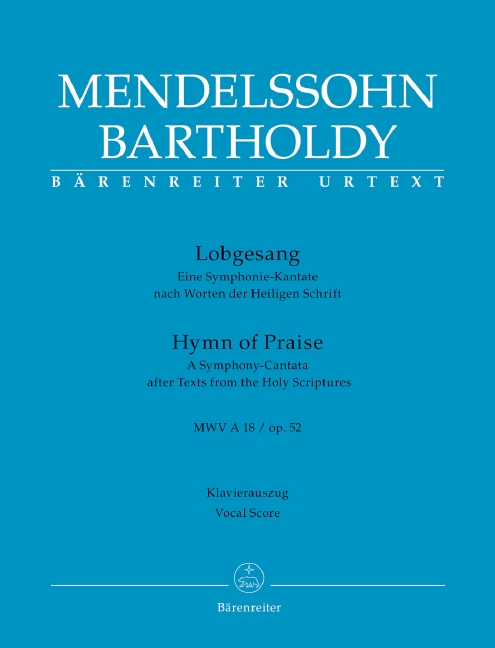Hymn of Praise, Op.52 MWV A 18 (Lobgesang) (Vocal score)
Description
Mendelssohn's contemporaries frequently mentioned his "Hymn of Praise" in the same breath as Beethoven's Ninth - and often enough viewed it as an imitation. Mendelssohn authority John Michael Cooper, in his extensive Introduction to this new Urtext edition, shows that the comparison is completely unfounded: with this work Mendelssohn created a new genre to which he gave the name "symphony-cantata". Later he added a secular counterpart with "Die Erste Walpurgisnacht".
Drawing on all relevant sources, Cooper provides a detailed account of the genesis and structure of this monumental work. Rounding off his scholarly performing edition are notes on the work's performance, e.g. tempo, articulation and dynamics.
For the first time the piano reduction includes Mendelssohn's authorised version of the "Sinfonia", based on the first edition of No. 1 for piano solo
- No. 1. [Sinfonia]:
- No. 1[a] Maestoso con moto - Allegro
- No. 1[b] Allegretto un poco agitato
- No. 1[c] Adagio religioso
- No. 2. [Choir.] Alles, was Odem hat / All that has life and breath
- No. 3. Recitativo [and Aria.] Saget es, die ihr erlöset seid - Er zählet unsre Tränen / Sing ye praise, all ye redeemed - He counteth all your sorrows
- No. 4. Choir. Sagt es, die ihr erlöset seid / All ye that cried unto the Lord
- No. 5. [Duet with choir.] Ich harrete des Herrn / I waited for the Lord
- No. 6. [Aria.] Stricke des Todes / The sorrows of death
- No. 7. [Choir] Die Nacht ist vergangen / The night is departed
- No. 8. Chorale. Nun danket alle Gott / Let all men praise the Lord
- No. 9. [Duet.] Nun sing' ich mit meinem Liede / My song shall be therefore thy mercy
- No. 10. Final chorus. Ihr Völker, bringet her dem Herrn / Ye nations, offer to the Lord
- Winkel Antwerpen : Available
